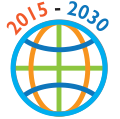 2030 agenda for sustainable development
2030 agenda for sustainable development
The global development agenda impacts directly on the work of local government, which is responsible for the delivery of many of the key services that will contribute towards the achievement of global targets. A Global Taskforce, of which CLGF is a member, has worked to ensure greater understanding and recognition of local government’s contribution to meeting global and national development targets. Local government’s engagement with the Agenda 2030 and the new Sustainable Development Goals; efforts to reduce the impacts of climate change; the Addis Ababa Agenda for Action on financing development; Habitat III and the New Urban Agenda, and others is being increasingly recognised. This section provides material on the global development agenda, information on how local government is contributing to global development targets, and information about multilateral and bilateral donor strategies relevant to local government. CLGFs work is informed by global development initiatives which we proactively contribute to on behalf of our members, such as through the Global Taskforce of local and regional governments for post-2015 development agenda towards Habitat III. This includes the 2030 agenda for sustainable development which will guide and inform development priorities over the next 15 years, and Habitat III - the third UN conference on Housing and Sustainable Urban Development in 2016.
Sub-topics:
- Development partner policies
- International treaties and commitments
- Sustainable Development Goals
- Climate change
Featured
Linking sustainable local economic development to a market-based carbon control regime : carbon restoration projects in the Eastern Cape province of South Africa using Portulacaria afra
Orientation: There is growing interest in how international climate change mitigation and adaptation programmes play out at the local level. Research purpose: The aim of this study was to investigate the link between land restoration and carbon sequestration projects in the Eastern Cape, using Portulacaria afra (Spekboom), and market-based approaches to address global climate change. Motivation for the study: The Eastern Cape is one of the poorest areas of the country, and there is great emphasis on the establishment of economically and environmentally sustainable, as well as socially just, local economic development (LED) initiatives. However, LED projects are often not sustainable in the long run. Research design, approach and method: A mixed methods design, using data on international carbon markets, and key stakeholder interviews with those involved in LED land restoration programmes, was used. Qualitative results were analysed using Connelly’s (2007) framework for sustainable development, which included indicators for environmental protection, economic growth and social justice. Main findings: Stakeholders perceive the long-term financial sustainability of such projects as resting on their ability to earn carbon credits, despite the current very low international carbon prices. Practical/managerial implications: The long-term success of carbon-based restoration projects may depend on the establishment of a local carbon market or continued public funding. Upfront costs of land restoration projects are high and return only starts years later. Contribution/value-add: The establishment of a South African carbon market that helps carbon sequestration LED projects to meet the technical and administrative requirements needed to sell carbon credits will be an important determinant of their sustainability.
Author: Jeanette Snowball, James Polak Publisher: Sabinet African Journals Publication year: 2019
Economic Growth and Sustainable Development in the Pacific Island Countries
The Pacific island countries (PICs) have benefited from the growth in Asia and the Pacific in the last 2 decades by integrating their economies within Asia and loosening ties with the Americas in some instances. Several bottlenecks however, still hamper sustainable economic growth in the region. For instance, Papua New Guinea (PNG) (with 7.6 million people), Fiji (with 850,000 people), and Solomon Islands (with 611,500 people) together account for about 90% of the population of all 15 PICs while 6 other PICs have populations of less than 20,000), discounting the economies of scale in the PICs as industrialization remains minimal. High transportation and raw material costs also make entrepreneurship difficult to sustain, leaving the islanders to survive at subsistence levels with family, clan, and community ties providing the social safety net. To foster sustainable economic growth therefore, the PICs need to invest in niche markets, upgrade their transport infrastructure, improve access to trade and invest in environmentally sustainable industries.
Author: Juswanto Wawan, Ali Zulfiqar Publisher: ADB Publication year: 2016
Economic Growth in the Pacific Island Countries—Challenges, Constraints, and Policy Responses
Economic growth among the Pacific island countries (PICs) has lagged most peer groups for more than a decade. This chapter provides an overview of the policy issues and challenges faced by these countries, and discusses the factors that have contributed to the low rates of economic growth in the region. It seeks to identify policies that could help raise growth performance in a way that is both inclusive and sustainable. The countries examined are Fiji, Kiribati, the Marshall Islands, Micronesia, Palau, Papua New Guinea, Samoa, the Solomon Islands, Timor-Leste, Tonga, Tuvalu, and Vanuatu. All are IMF members.
The picture that emerges is that the below-par growth performance of PICs can be partly explained by the region’s unique characteristics. But policies also matter.
Author: Hoe Khor, Roger Kronenberg, and Patrizia Tumbarello Publisher: IMF Publication year: 2016
THE CHALLENGE OF LOCAL GOVERNMENT FINANCING IN DEVELOPING COUNTRIES
This report – an outcome of an expert group meeting held on the challenge of local government financing in developing countries – documents both the challenges and solutions related to the ability of local governments to mobilize revenues from local resources. The report also identifies successful governance mechanisms for efficient and equitable provision of public services in metropolitan areas of developing countries, and shares experiences and methods to making public service provision more viable in peri-urban areas of large cities and in smaller urban centres of these countries.
Author: United Nations Human Settlements Programme (UN-HABITAT) Publisher: United Nations Human Settlements Programme (UN-HABITAT) Publication year: 2015



